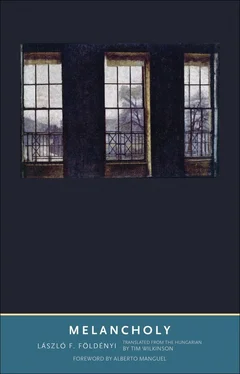At every moment, the life of a melancholic partakes of resurrection — that is why he does not die, at least not in the physical sense. A life that encloses resurrection within itself is a complete life and is therefore threatened not by death but by ordinary life, which rejects the ever-present possibility of resurrection, that is, of ecstasy. That is why melancholic heroes were misanthropes (as heroes, they differed from everybody else anyway), while melancholic philosophers, if not expressly misanthropic, looked down on those who were stuck in darkness and ignorance, for once the soul reaches the state of knowledge (in Plato’s vocabulary, the invisible realm, which is akin to it), then it becomes perfect, and as the initiated say, their remaining time is spent in truth and among the gods (see Phaedrus , 249c — d). A person who partakes of resurrection rises out of the world of earthly beings toward real beings (  , 247e). Ascent, however, like the Platonic notion of anamnesis, should be interpreted as a metaphor and, over and above its literal meaning, should be related to earthly existence per se: to unfurling and understanding our life here, in this world. That, however, as we have seen, is given only to those blessed with certain abilities — to the elect who, because they see past everything, become isolated from others, and whose knowledge and vision make them outcasts. This outcast state is dual: not only are they excluded from the world of others, but they must also step out of themselves. On that account, their knowledge is not uplifting but disheartening, depressing; they are incapable of living like others — since they see everything, they also cannot forget. 18Soothsayers, with their divine knowledge and earthly fate, maniacs well-versed in the realm of invisible things but threatened by illness, philosophers examining the turning of being and nonbeing into each other; in short, all those who are melancholic are solitary, and since they are partakers not just of human but also of superhuman existence, even death will fail to bring an end to their solitude.
, 247e). Ascent, however, like the Platonic notion of anamnesis, should be interpreted as a metaphor and, over and above its literal meaning, should be related to earthly existence per se: to unfurling and understanding our life here, in this world. That, however, as we have seen, is given only to those blessed with certain abilities — to the elect who, because they see past everything, become isolated from others, and whose knowledge and vision make them outcasts. This outcast state is dual: not only are they excluded from the world of others, but they must also step out of themselves. On that account, their knowledge is not uplifting but disheartening, depressing; they are incapable of living like others — since they see everything, they also cannot forget. 18Soothsayers, with their divine knowledge and earthly fate, maniacs well-versed in the realm of invisible things but threatened by illness, philosophers examining the turning of being and nonbeing into each other; in short, all those who are melancholic are solitary, and since they are partakers not just of human but also of superhuman existence, even death will fail to bring an end to their solitude.
That is not the solitude of the Romantics of the modern age. The workaday world of the Greeks did make attempts to break through the carapace of the solitude of melancholics and, in contrast with the modern age, strove to master, or at least grasp, their point of view. The possibility of this-worldly resurrection, offered by the mysteries, was inseparable from the melancholic interpretation of existence, and although these mysteries themselves had seemingly nothing in common with melancholia, the way of looking at things and knowledge that the mysteries sought to offer to initiates pointed in the direction of melancholia. 19The mysteries were therefore among the most daring experiments of Greek culture: they allowed thousands to partake of knowledge that would render them melancholics (that is, prophets, madmen, and philosophers). But the most fundamental law of human coexistence does not permit everyone to become omniscient, all-seeing, and so in the final analysis, solitary and isolated. For melancholia to overwhelm a person, it is necessary that others be free of it; to live in truth, it is necessary to be surrounded by a world of untruth; 20for a person to be deeply penetrating, something has to be deep lying, there have to be both shallows and depths. Truth and knowledge are not given to all, they are not distributed on a democratic basis, whereas the mysteries were “democratic” institutions in both their political and intellectual aims. 21For precisely this reason, they were the most baffling formations of Greek culture: as if they had attempted to mix fire and water, but the two nevertheless did not extinguish each other. Only a negligible fraction of the initiates became melancholic (though anyone who was melancholic had almost invariably been initiated). In other words, the mysteries per se were not directed at melancholia, but they did carry the potential for initiates to become melancholic. And not just that: they also mark out a system of relations in which any melancholic can get entangled. In the case of heroes, as we have seen, there is no manifest reason for their melancholia, for if there were, a cure might also be possible. Yet there are certain situations that can burst latent melancholia open (Achilles’ armor is confiscated from Ajax, Bellerophon ascends to the heavens, Heracles visits the underworld, etc.). In this sense, the mysteries are borderline situations. Initiation, at least in the view of Dio Chrysostom, was in effect tantamount to contemplating the universe; 22that is, initiates partook of the most profound knowledge. According to Plato, before the beginning of life on Earth, we had been participants in the happiest initiation, that is, earthly initiation is already an intermediate act of a colossal drama, an evocation of an otherworldly, prenatal, and postmortem existence. In the course of that evocation, the soul recollects everything it had once seen while it consorted with the divine spirit, and for that reason — one thinks here of the original meaning of the word “philosophy”—“the mind of the philosopher alone has wings; and this is just, for he is always, according to the measure of his abilities, clinging in recollection to those things in which God abides, and in beholding which He is what He is” ( Phaedrus , 249c). Only a person who makes proper use of his recollections can lay claim to true knowledge; only that person can be a complete person and can partake of true initiation (  ). Initiation makes a person learned; the greatest knowledge, however, does not recognize the limits of earthly existence: it draws into its own sphere the world of unearthliness, of prenatal and postmortem existence. In a certain sense, then, initiation is akin to soothsaying and resurrection: it places the initiate outside time, draws birth and death together into a single moment, and, as it were, complying with the doctrine of Thales, according to which there is no fundamental difference between life and death, makes the opposition of the two relative. That was why Sophocles held those initiated in the mysteries to be the happiest: not only do they discover death in life, but in death they also come across life. The very word used for “initiation” (
). Initiation makes a person learned; the greatest knowledge, however, does not recognize the limits of earthly existence: it draws into its own sphere the world of unearthliness, of prenatal and postmortem existence. In a certain sense, then, initiation is akin to soothsaying and resurrection: it places the initiate outside time, draws birth and death together into a single moment, and, as it were, complying with the doctrine of Thales, according to which there is no fundamental difference between life and death, makes the opposition of the two relative. That was why Sophocles held those initiated in the mysteries to be the happiest: not only do they discover death in life, but in death they also come across life. The very word used for “initiation” (  ) refers to stepping out of customary frameworks: it is related to the verb “to complete” or “to die” (
) refers to stepping out of customary frameworks: it is related to the verb “to complete” or “to die” (  ), 23its root being formed by the word
), 23its root being formed by the word  , which means equally “goal,” “end,” “boundary,” “decision,” and “fulfillment.” The initiate dies in a certain sense, or at least becomes intimate with death. The fourth-century author Firmicus Maternus, who nurtured hostile feelings toward the mysteries, referred to would-be initiates as Homo moriturus . Since death transports the initiate into the world of “truly existing” things, he is reborn: he turns his back on his previous life. For those initiated at Eleusis in ancient Greece, a happy existence in the hereafter was guaranteed, but the symbolic-voluntary acceptance of death 24was a precondition for gaining salvation (
, which means equally “goal,” “end,” “boundary,” “decision,” and “fulfillment.” The initiate dies in a certain sense, or at least becomes intimate with death. The fourth-century author Firmicus Maternus, who nurtured hostile feelings toward the mysteries, referred to would-be initiates as Homo moriturus . Since death transports the initiate into the world of “truly existing” things, he is reborn: he turns his back on his previous life. For those initiated at Eleusis in ancient Greece, a happy existence in the hereafter was guaranteed, but the symbolic-voluntary acceptance of death 24was a precondition for gaining salvation (  ). Death itself was the supreme mystery: as reported by Plutarch, in a work entitled On the Soul , Themistios wrote, “The soul (at the point of death) has the same experience as those who are being initiated into the great mysteries; for that reason, a similarity subsists between the verbs ‘to die’ and ‘to be initiated’ and the actions they designate” (quoted by Edgar Wind, Pagan Mysteries in the Renaissance , 181). According to Socrates, sound philosophizing consists in the preparation for death, whereas Pindar writes as follows about the Eleusinian initiates: “Blessed is he who has seen these things before he goes beneath the earth; for he understands the end of mortal life, and the beginning (of a new life) given of Zeus” (frag. 102).
). Death itself was the supreme mystery: as reported by Plutarch, in a work entitled On the Soul , Themistios wrote, “The soul (at the point of death) has the same experience as those who are being initiated into the great mysteries; for that reason, a similarity subsists between the verbs ‘to die’ and ‘to be initiated’ and the actions they designate” (quoted by Edgar Wind, Pagan Mysteries in the Renaissance , 181). According to Socrates, sound philosophizing consists in the preparation for death, whereas Pindar writes as follows about the Eleusinian initiates: “Blessed is he who has seen these things before he goes beneath the earth; for he understands the end of mortal life, and the beginning (of a new life) given of Zeus” (frag. 102).
Читать дальше

 , 247e). Ascent, however, like the Platonic notion of anamnesis, should be interpreted as a metaphor and, over and above its literal meaning, should be related to earthly existence per se: to unfurling and understanding our life here, in this world. That, however, as we have seen, is given only to those blessed with certain abilities — to the elect who, because they see past everything, become isolated from others, and whose knowledge and vision make them outcasts. This outcast state is dual: not only are they excluded from the world of others, but they must also step out of themselves. On that account, their knowledge is not uplifting but disheartening, depressing; they are incapable of living like others — since they see everything, they also cannot forget. 18Soothsayers, with their divine knowledge and earthly fate, maniacs well-versed in the realm of invisible things but threatened by illness, philosophers examining the turning of being and nonbeing into each other; in short, all those who are melancholic are solitary, and since they are partakers not just of human but also of superhuman existence, even death will fail to bring an end to their solitude.
, 247e). Ascent, however, like the Platonic notion of anamnesis, should be interpreted as a metaphor and, over and above its literal meaning, should be related to earthly existence per se: to unfurling and understanding our life here, in this world. That, however, as we have seen, is given only to those blessed with certain abilities — to the elect who, because they see past everything, become isolated from others, and whose knowledge and vision make them outcasts. This outcast state is dual: not only are they excluded from the world of others, but they must also step out of themselves. On that account, their knowledge is not uplifting but disheartening, depressing; they are incapable of living like others — since they see everything, they also cannot forget. 18Soothsayers, with their divine knowledge and earthly fate, maniacs well-versed in the realm of invisible things but threatened by illness, philosophers examining the turning of being and nonbeing into each other; in short, all those who are melancholic are solitary, and since they are partakers not just of human but also of superhuman existence, even death will fail to bring an end to their solitude. ). Initiation makes a person learned; the greatest knowledge, however, does not recognize the limits of earthly existence: it draws into its own sphere the world of unearthliness, of prenatal and postmortem existence. In a certain sense, then, initiation is akin to soothsaying and resurrection: it places the initiate outside time, draws birth and death together into a single moment, and, as it were, complying with the doctrine of Thales, according to which there is no fundamental difference between life and death, makes the opposition of the two relative. That was why Sophocles held those initiated in the mysteries to be the happiest: not only do they discover death in life, but in death they also come across life. The very word used for “initiation” (
). Initiation makes a person learned; the greatest knowledge, however, does not recognize the limits of earthly existence: it draws into its own sphere the world of unearthliness, of prenatal and postmortem existence. In a certain sense, then, initiation is akin to soothsaying and resurrection: it places the initiate outside time, draws birth and death together into a single moment, and, as it were, complying with the doctrine of Thales, according to which there is no fundamental difference between life and death, makes the opposition of the two relative. That was why Sophocles held those initiated in the mysteries to be the happiest: not only do they discover death in life, but in death they also come across life. The very word used for “initiation” (  ) refers to stepping out of customary frameworks: it is related to the verb “to complete” or “to die” (
) refers to stepping out of customary frameworks: it is related to the verb “to complete” or “to die” (  ), 23its root being formed by the word
), 23its root being formed by the word  , which means equally “goal,” “end,” “boundary,” “decision,” and “fulfillment.” The initiate dies in a certain sense, or at least becomes intimate with death. The fourth-century author Firmicus Maternus, who nurtured hostile feelings toward the mysteries, referred to would-be initiates as Homo moriturus . Since death transports the initiate into the world of “truly existing” things, he is reborn: he turns his back on his previous life. For those initiated at Eleusis in ancient Greece, a happy existence in the hereafter was guaranteed, but the symbolic-voluntary acceptance of death 24was a precondition for gaining salvation (
, which means equally “goal,” “end,” “boundary,” “decision,” and “fulfillment.” The initiate dies in a certain sense, or at least becomes intimate with death. The fourth-century author Firmicus Maternus, who nurtured hostile feelings toward the mysteries, referred to would-be initiates as Homo moriturus . Since death transports the initiate into the world of “truly existing” things, he is reborn: he turns his back on his previous life. For those initiated at Eleusis in ancient Greece, a happy existence in the hereafter was guaranteed, but the symbolic-voluntary acceptance of death 24was a precondition for gaining salvation (  ). Death itself was the supreme mystery: as reported by Plutarch, in a work entitled On the Soul , Themistios wrote, “The soul (at the point of death) has the same experience as those who are being initiated into the great mysteries; for that reason, a similarity subsists between the verbs ‘to die’ and ‘to be initiated’ and the actions they designate” (quoted by Edgar Wind, Pagan Mysteries in the Renaissance , 181). According to Socrates, sound philosophizing consists in the preparation for death, whereas Pindar writes as follows about the Eleusinian initiates: “Blessed is he who has seen these things before he goes beneath the earth; for he understands the end of mortal life, and the beginning (of a new life) given of Zeus” (frag. 102).
). Death itself was the supreme mystery: as reported by Plutarch, in a work entitled On the Soul , Themistios wrote, “The soul (at the point of death) has the same experience as those who are being initiated into the great mysteries; for that reason, a similarity subsists between the verbs ‘to die’ and ‘to be initiated’ and the actions they designate” (quoted by Edgar Wind, Pagan Mysteries in the Renaissance , 181). According to Socrates, sound philosophizing consists in the preparation for death, whereas Pindar writes as follows about the Eleusinian initiates: “Blessed is he who has seen these things before he goes beneath the earth; for he understands the end of mortal life, and the beginning (of a new life) given of Zeus” (frag. 102).










